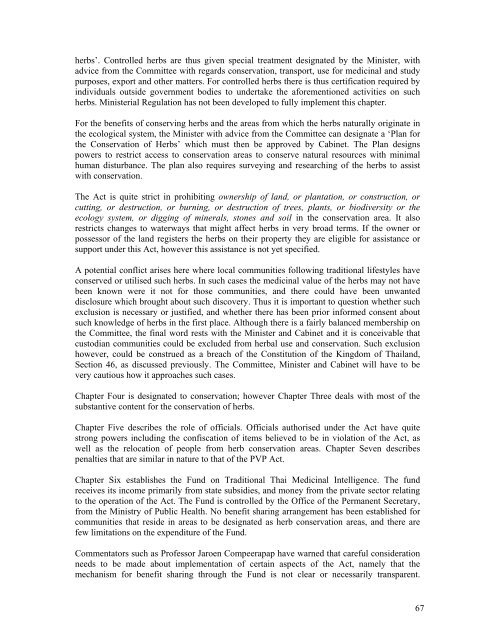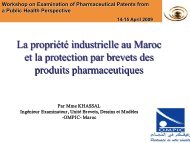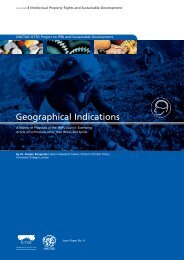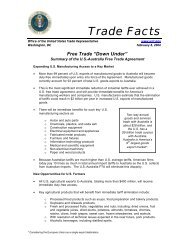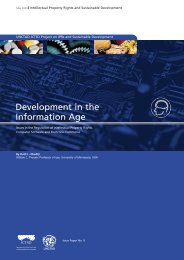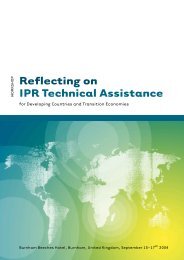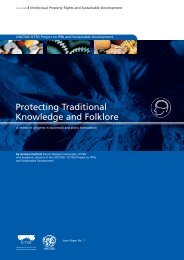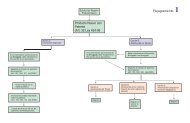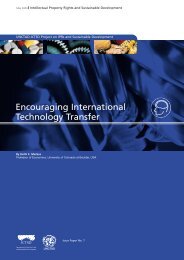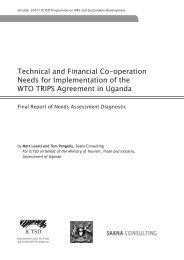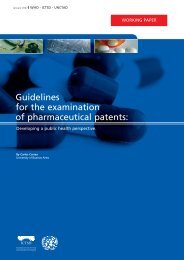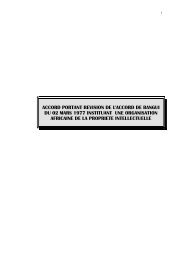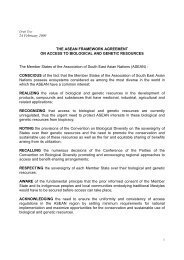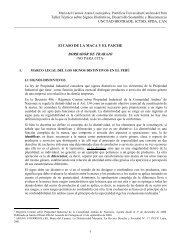Governance and Micropolitics of Traditional ... - IPRsonline.org
Governance and Micropolitics of Traditional ... - IPRsonline.org
Governance and Micropolitics of Traditional ... - IPRsonline.org
Create successful ePaper yourself
Turn your PDF publications into a flip-book with our unique Google optimized e-Paper software.
herbs’. Controlled herbs are thus given special treatment designated by the Minister, with<br />
advice from the Committee with regards conservation, transport, use for medicinal <strong>and</strong> study<br />
purposes, export <strong>and</strong> other matters. For controlled herbs there is thus certification required by<br />
individuals outside government bodies to undertake the aforementioned activities on such<br />
herbs. Ministerial Regulation has not been developed to fully implement this chapter.<br />
For the benefits <strong>of</strong> conserving herbs <strong>and</strong> the areas from which the herbs naturally originate in<br />
the ecological system, the Minister with advice from the Committee can designate a ‘Plan for<br />
the Conservation <strong>of</strong> Herbs’ which must then be approved by Cabinet. The Plan designs<br />
powers to restrict access to conservation areas to conserve natural resources with minimal<br />
human disturbance. The plan also requires surveying <strong>and</strong> researching <strong>of</strong> the herbs to assist<br />
with conservation.<br />
The Act is quite strict in prohibiting ownership <strong>of</strong> l<strong>and</strong>, or plantation, or construction, or<br />
cutting, or destruction, or burning, or destruction <strong>of</strong> trees, plants, or biodiversity or the<br />
ecology system, or digging <strong>of</strong> minerals, stones <strong>and</strong> soil in the conservation area. It also<br />
restricts changes to waterways that might affect herbs in very broad terms. If the owner or<br />
possessor <strong>of</strong> the l<strong>and</strong> registers the herbs on their property they are eligible for assistance or<br />
support under this Act, however this assistance is not yet specified.<br />
A potential conflict arises here where local communities following traditional lifestyles have<br />
conserved or utilised such herbs. In such cases the medicinal value <strong>of</strong> the herbs may not have<br />
been known were it not for those communities, <strong>and</strong> there could have been unwanted<br />
disclosure which brought about such discovery. Thus it is important to question whether such<br />
exclusion is necessary or justified, <strong>and</strong> whether there has been prior informed consent about<br />
such knowledge <strong>of</strong> herbs in the first place. Although there is a fairly balanced membership on<br />
the Committee, the final word rests with the Minister <strong>and</strong> Cabinet <strong>and</strong> it is conceivable that<br />
custodian communities could be excluded from herbal use <strong>and</strong> conservation. Such exclusion<br />
however, could be construed as a breach <strong>of</strong> the Constitution <strong>of</strong> the Kingdom <strong>of</strong> Thail<strong>and</strong>,<br />
Section 46, as discussed previously. The Committee, Minister <strong>and</strong> Cabinet will have to be<br />
very cautious how it approaches such cases.<br />
Chapter Four is designated to conservation; however Chapter Three deals with most <strong>of</strong> the<br />
substantive content for the conservation <strong>of</strong> herbs.<br />
Chapter Five describes the role <strong>of</strong> <strong>of</strong>ficials. Officials authorised under the Act have quite<br />
strong powers including the confiscation <strong>of</strong> items believed to be in violation <strong>of</strong> the Act, as<br />
well as the relocation <strong>of</strong> people from herb conservation areas. Chapter Seven describes<br />
penalties that are similar in nature to that <strong>of</strong> the PVP Act.<br />
Chapter Six establishes the Fund on <strong>Traditional</strong> Thai Medicinal Intelligence. The fund<br />
receives its income primarily from state subsidies, <strong>and</strong> money from the private sector relating<br />
to the operation <strong>of</strong> the Act. The Fund is controlled by the Office <strong>of</strong> the Permanent Secretary,<br />
from the Ministry <strong>of</strong> Public Health. No benefit sharing arrangement has been established for<br />
communities that reside in areas to be designated as herb conservation areas, <strong>and</strong> there are<br />
few limitations on the expenditure <strong>of</strong> the Fund.<br />
Commentators such as Pr<strong>of</strong>essor Jaroen Compeerapap have warned that careful consideration<br />
needs to be made about implementation <strong>of</strong> certain aspects <strong>of</strong> the Act, namely that the<br />
mechanism for benefit sharing through the Fund is not clear or necessarily transparent.<br />
67


